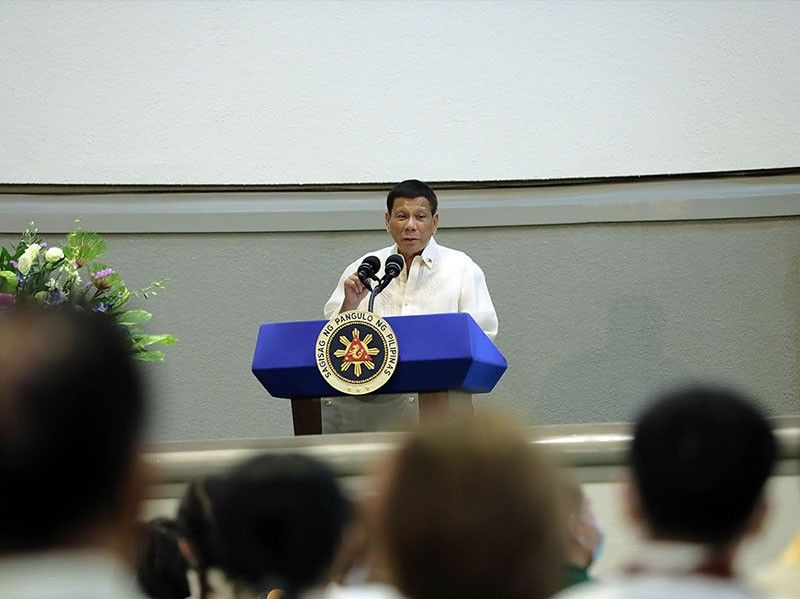Duterte approves EO updating foreign investment rules

MANILA, Philippines — President Rodrigo Duterte has signed an executive order (EO) updating the regular foreign investment negative list, which enumerates the areas or activities open to foreign investors and those that are reserved only to Filipino nationals.
The 12th regular foreign investment negative list was promulgated through EO No. 175 issued on June 27. It replaced the 11th regular foreign investment negative list approved in 2018.
Duterte said there is a need to formulate the 12th regular foreign investment negative list to reflect changes pursuant to existing laws, "consistent with the policy to ease restrictions on foreign participation in certain investment areas or activities."
The crafting of the list is required under the Foreign Investments Act of 1991.
The regular foreign investment negative list is composed of two lists. List A may be amended anytime to reflect changes instituted in specific laws. Amendments to List B shall not be made more often than once every two years, pursuant to theForeign Investments Act
List A specified the areas where foreign ownership is limited by mandate of the constitution and specific laws.
Areas where no foreign equity is allowed are mass media except recording and internet business; and practice of professions except in cases specifically allowed by law. These include professions where foreigners were not allowed to practice in the Philippines except if subject to reciprocity as provided in pertinent laws and corporate practice of professions with foreign equity restrictions under pertinent laws.
Professions where foreigners are not allowed to practice in the Philippines except if subject to reciprocity as provided by pertinent laws are accountancy, aeronautical engineering, agricultural and biosystems engineering, agriculture, architecture, chemical engineering, chemistry, civil engineering, criminology, customs brokers, dentistry, electrical engineering, electronics technician, environmental planning, fisheries, food technology, forestry, geodetic engineering, geology, guidance and counseling, interior design, landscape architecture, librarianship, marine deck and engineering, master plumbing, mechanical engineering, medical technology, medicine, metallurgical engineering, midwifery, naval architecture, nursing, nutrition and dietetics, optometry, pharmacy, physical and occupational therapy, professional teaching, psychology, radiologic and x-ray technology. real estate service, respiratory therapy, sanitary engineering, social work, speech language pathology, veterinary medicine and other professions as may be provided by law or treaty where the Philippines is a party.
Other areas where no foreign equity is permitted are retail trade enterprises with paid-up capital of less than P25-million; cooperatives, except investments of former natural born citizens of the Philippines; organization and operation of private detective, watchmen or security guards agencies; small-scale mining; utilization of marine resources in archipelagic waters, territorial sea and exclusive economic zone, as well as small-scale use of natural resources in rivers, lakes, bays and lagoons; ownership, operation and management of cockpits; manufacture, repair, stockpiling and/or distribution of nuclear weapons; manufacture, repair, stockpoling and/or distribution of biological, chemical and radiological weapons and anti-personnel mines; and manufacture of firecrackers and other pyrotechnic devices.
Areas where the allowed foreign equity is only up to 25% are private recruitment, whether local or overseas employment; and contracts for the construction of defense related structures.
Up to 30% foreign equity is allowed in advertising while the 40% limit applies to procurement of infrastructure; exploration, development and utilization of natural resources; ownership of private lands, except a natural born citizen who has lost his Philippine citizenship and who has the legal capacity to enter into a contract under Philippine laws; operation of public utilities; educational institutions other than those established by religious groups and mission boards, for foreign diplomatic personnel and their dependents and other foreign temporary residents, or for short-term high-level skills development that do not form part of the formal education system; culture, production, milling, processing, trading except retailing of rice and corn and acquiring, by barter, purchase or otherwise, rice and corn and the by-products thereof; contracts for the supply of materials, goods and commodities to to government-owned or controlled corporations, company, agency or municipal corporation; operation of deep sea commercial fishing vessels; ownership of condominium units and private radio telecommunication network.
List B enumerated the areas where foreign ownership is limited for reasons related to security, defense, health and morals and for the protection of small and medium scale enterprises.
Up to 40% foreign equity are allowed in the manufacture, repair, storage or distribution of products or ingredients requiring police clearance namely firearms, gunpowder, dynamit, blasting supplies, ingredients used in making explosives and telescopic sights, sniper scope and other similar devices; manufacture and distribution of dangerous drugs; sauna and steam bathhouses, massage clinics and other similar activities, except wellness centers; all forms of gambling except those covered by investment agreements with the state-run Philippine Amusement and Gaming Corp.; micro and small domestic market enterprises with paid in equity capital of less than the equivalent of $200,000; and micro and small domestic market enterprises that involve advance technology or are endorsed as startup or startup enablers by state agencies; or those whose majority of direct employees are Filipinos, provided that their Filipino employees should not be less than 15, and with a paid-in equity capital of less than the equivalent of $100,000.
- Latest
- Trending





























